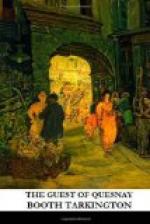“Eh, but you are wiser than Clemenceau!” said the chauffeur. “Get up, my ancient, and you there, with the brushwood, let the fire go for a moment and help, when I say the word. And you, monsieur,” he turned to Ward, “if you please, will you pull with me upon the ankle here at the right moment?”
The carters, the labourers, the men from the other automobile, and I laid hold of the car together.
“Now, then, messieurs, lift!”
Stifled with the gasoline smoke, we obeyed. One or two hands were scorched and our eyes smarted blindingly, but we gave a mighty heave, and felt the car rising.
“Well done!” cried the chauffeur. “Well done! But a little more! The smallest fraction—ha! It is finished, messieurs!”
We staggered back, coughing and wiping our eyes. For a minute or two I could not see at all, and was busy with a handkerchief.
Ward laid his hand on my shoulder.
“Do you know who it is?” he asked.
“Yes, of course,” I answered.
When I could see again, I found that I was looking almost straight down into the upturned face of Larrabee Harman, and I cannot better express what this man had come to be, and what the degradation of his life had written upon him, than by saying that the dreadful thing I looked upon now was no more horrible a sight than the face I had seen, fresh from the valet and smiling in ugly pride at the starers, as he passed the terrace of Larue on the day before the Grand Prix.
We helped to carry him to the doctor’s car, and to lift the dancer into Ward’s, and to get both of them out again at the hospital at Versailles, where they were taken. Then, with no need to ask each other if we should abandon our plan to breakfast in the country, we turned toward Paris, and rolled along almost to the barriers in silence.
“Did it seem to you,” said George finally, “that a man so frightfully injured could have any chance of getting well?”
“No,” I answered. “I thought he was dying as we carried him into the hospital.”
“So did I. The top of his head seemed all crushed in—Whew!” He broke off, shivering, and wiped his brow. After a pause he added thoughtfully, “It will be a great thing for Louise.”
Louise was the name of his second cousin, the girl who had done battle with all her family and then run away from them to be Larrabee Harman’s wife. Remembering the stir that her application for divorce had made, I did not understand how Harman’s death could benefit her, unless George had some reason to believe that he had made a will in her favour. However, the remark had been made more to himself than to me and I did not respond.
The morning papers flared once more with the name of Larrabee Harman, and we read that there was “no hope of his surviving.” Ironic phrase! There was not a soul on earth that day who could have hoped for his recovery, or who—for his sake—cared two straws whether he lived or died. And the dancer had been right; one of her legs was badly broken: she would never dance again.




